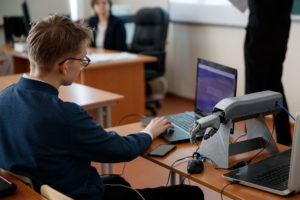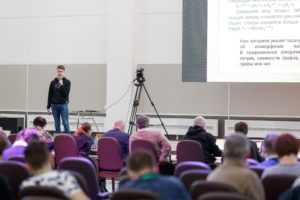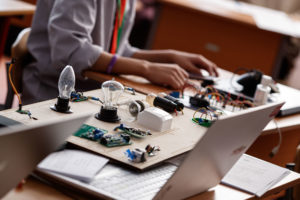12 principles of «Phystech-Lyceum»
1. EDUCATION WITH A HUMAN FACE.
A child’s stable motivation for learning and research activities, as well as the degree of socialization that allows us to judge him as a harmoniously developed personality.
2. THERE ARE NO LIMITS FOR TALENT.
Children from any region should have the opportunity to study at Phystech-Lyceum.
3. COMPETITIVE SELECTION SYSTEM.
The possibility of selecting students for all classes of Phystech-Lyceum by competition is being considered. Transfer from primary to secondary school should not happen automatically either. During the selection tests, it is proposed to evaluate both the child’s acquired knowledge and abilities so that talented children from different schools have the opportunity to enter Phystech-Lyceum. We strive to ensure that the right teachers help to reveal the intellectual potential of students, therefore an important task for the school is the stage of searching for truly talented children, and not just well-prepared ones.

4. BALANCE IN EVERY EXAMPLE.
There should be a balance between physics and lyricism in the soul.
At Phystech-Lyceum, we consider one of the most important goals to be to raise not just masters of solving problems in physics and mathematics (even Olympiad ones), but people who will be accepted into society as harmonious, balanced individuals. For us, this means giving children the right social skills and a good grounding in the humanities.
5. BOTH OLYMPIAD PARTICIPANTS AND RESEARCHERS.
The fast thinking required to succeed in subject Olympiads is not inherent in all talented people. There are many amazing scientists who falter under the pressure of time constraints, but flourish when they can work without the hustle and bustle of competition. We call this type of activity «project-based». Progress requires both «Olympiad winners» and «researchers». The same goes for school. The coexistence of students with different types of thinking has a positive effect on overall results.
6. PEOPLE OF SCIENCE OF THE FUTURE.
Biophysics, biochemistry, physical and chemical processes, computer linguistics, robotics, medicine, geophysics. Discoveries in modern science increasingly occur at the intersection of disciplines. History uses physical and chemical methods to determine dates, sociology uses statistics. All of the above has enormous mathematical support. Identifying children with talents for different subjects and providing them with the opportunity to develop in unusual combinations of subjects stimulates the emergence of a new wave of researchers — people of science of the future.

7. OUR WHOLE LIFE IS A GAME.
The Olympiad movement is an interesting game practice in education that motivates many strong children to study. But this practice has two side effects:
Competition often breeds hostility; speed is not always quality. We see solutions to compensate for these side effects at Phystech Lyceum in:
— game practice that unites children into teams and thus teaches them the benefits of cooperation and mutual assistance;
— research projects where, in conditions of free time, it is necessary to understand an interesting question, conduct experiments, propose hypotheses and either prove or disprove them.
8. DON’T FORGET ABOUT PHYSICAL EDUCATION!
Phystech-Lyceum pays special attention to the physical training of students. Children should like physical education so that the excessive intellectual load can be compensated for in good physical activity.
9. A GOOD SCIENTIST IS A GOOD PERSON.
To raise scientists who will benefit humanity — this is the long-term mission of our school. In this regard, decency, conscience, and the ability to distinguish good from bad are the most important concepts for the moral and ethical education of a lyceum student. We are convinced that children should be friendly to each other, strive for mutual assistance and support, and rejoice in each other’s successes.

10. A TEACHER FOR LIFE.
The teachers of the Phystech-Lyceum see their task not only in preparing students for the Unified State Exam and imparting knowledge of the school curriculum, but also in developing their interest in research: they give research tasks, help them make discoveries, and help them tell other children about these discoveries. A good teacher at the Phystech school treats his students with respect, even if they are still small. It is quite possible that he is raising a future scientist who will far surpass the teacher himself in knowledge of the subject. Most of the great deeds and research of our time require teamwork. The time of loners has passed. The skills of working in a team of an individually strong master are critically important for his success as a specialist.
11. FRIENDSHIP AND MUTUAL ASSISTANCE WITHOUT AGE.
Contacts between senior pupils and junior pupils, as well as between any pupils and teachers, are encouraged.
12. FREEDOM OF CREATIVITY.
A free atmosphere around a child-researcher, a child-creator is extremely important for raising him/her. Only freedom (but not permissiveness) and reduced organizational pressure allow hidden abilities to manifest and stimulate independent motivation for learning and research work. You can’t order someone to become a scientist. You have to like it. It has to come from within. You have to feel the child and only push him/her to make independent decisions.




